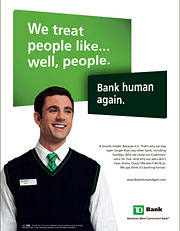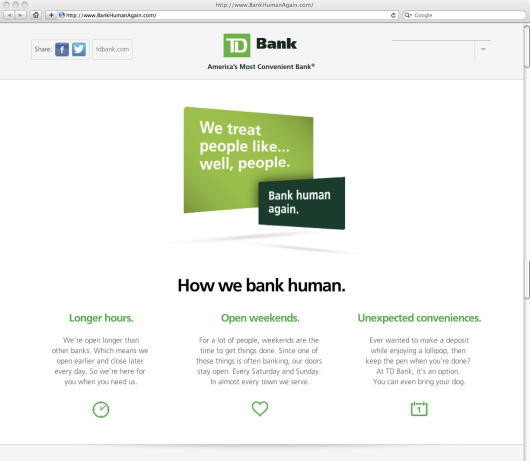A series of six 30-second TV spots anchor the campaign. One shows a customer struggling with a pen too tightly chained to the desk. In another, a bank closes right as a small business customer tries to make a five o’clock deposit. In all the spots, the fictitious competitor’s branch is a drab gray concrete bunker, and the faceless “service rep” is a robotic voice from nowhere.
“Ever wanted to make a deposit while enjoying a lollipop then keep the pen when you’re done? At TD Bank, it’s an option. You can even bring your dog.”
— TD Bank Microsite
The campaign will run in broadcast, print and digital. The TV ads will air on prime time programs throughout TD Bank’s footprint, including an enhanced presence in New York with a cable buy focused in the five boroughs. Print creative will appear in key publications throughout the Northeast. Digital components include YouTube videos and dynamic banners.
At TD Bank stores, customer vignettes will be featured on LCD screens showing proud customers sharing why they love TD. Additional campaign elements will be integrated across other platforms such as social media and public relations.
All campaign materials drive traffic to a long, single-page scrolling microsite: www.BankHumanAgain.com.

Industry Cloud for Banking from PwC
PwC’s Industry Cloud for Banking applies our deep industry knowledge to your specific business needs

The unfair advantage for financial brands.
Offering aggressive financial marketing strategies custom-built for leaders looking to redefine industry norms and establish market dominance.
Key Question: What does it mean to “bank human?” “Again?”
“‘Bank Human’ is all about people — our customers and employees,” said Vinoo Vijay, CMO at TD Bank. “The new marketing campaign viscerally communicates TD’s attributes of unparalleled service and convenience, and our customer-first culture.”
As evidence of the bank’s more humane approach, TD offers up these proof points:
- free pens that aren’t chained to desks in branches
- free lollipops in branches
- no rope lines in branch queues
- debit cards issued instantly in branches
- free coin counting in branches
- dogs are welcome in branches
- when it rains, employees will walk customers from the branch to their car with an umbrella
“We think that big and small things matter,” explained Vijay. “We think we do a better job of delivering those big and small things, so we’re calling it out.”
Okay, so TD doesn’t care if customers steal take pens. And they don’t treat people like cattle that need herding. But that hardly qualifies as a “humanized” banking experience. It may be a step in the right direction, but is it really something to brag about? Sure, an umbrella escort is a nice “human” touch. But free lollipops and pens? They are definitely little perks, but not really sufficient evidence of a more human experience.
And how does free coin counting or instant-issue debit cards create a more human banking experience? You can try to twist up some rationale that explains the connection, but really? Free coin counting and instant cards are in-branch conveniences. There’s really nothing “human” about them.
“Removing the rope lines doesn’t mean you are not going to wait on line,” added Robert Passikoff, the president of Brand Keys in New York.
Making a Big Deal Out of Branches in The Digital Age?
Indeed all the points of proof TD offers hinge on things that can only be experienced in branches, which is in itself a questionable strategy.
Patrick Hardy, EVP at Tierney, the advertising and creative agency that worked on the campaign, said people are tired of the impersonal digital world. “What people have been lacking and what we believe they have been craving,” he explained, “is human contact, especially when it comes to their money.”
 If that’s true, then it contradicts conventional wisdom in the banking sector, where financial institutions have be doing everything possible to drive consumers out of costly branch networks and into self-service/digital channels (where there is little- to no human interaction). And consumers have merrily obliged.
If that’s true, then it contradicts conventional wisdom in the banking sector, where financial institutions have be doing everything possible to drive consumers out of costly branch networks and into self-service/digital channels (where there is little- to no human interaction). And consumers have merrily obliged.
“Young people — especially those in their twenties — don’t care about customer service,” said Bob Marshall with Media Bistro. “About 90% of the people I know all bank with Chase. Now, anyone will tell you that they despise banking with Chase, but continue to do so because of the ubiquity of Chase ATMs all over the city and the ease with which its website functions.”
While TD is proud of its mobile and self-service options, the bank deliberately chose not to feature non-branch channels in its campaign.
“Our campaign point is not about not being able to use technology. It’s about the fact that it shouldn’t be the only option,” said Vijay, TD’s CMO. “You shouldn’t take it out and say you can’t talk to a human.”

How Personal Can You Get?
TD is trying to tap consumers’ cultural nostalgia for the kind of customer service people enjoyed in days gone by: “Remember when banking used to be different? We’re returning to a time when banking was more personal.”
Bob Marshall at Media Bistro agrees: “I see these ads appealing more toward older people, those who yearn for the days when you knew your banker by name and you could damn well take as many pens as you wanted.”
Can they live up to the promise? TD has no problems delivering on their mission to be “America’s most convenient bank.” But promising to be “more personal” amidst a sea of competitors all making the same claim is a tough pitch. As The Financial Brand has previously noted, everyone in banking thinks their terrific customer service is what differentiates them. It’s virtually impossible to differentiate around a “better service” promise. It just sounds like white noise to consumers. “Don’t tell me your service is good, just give me good service.” The only way to differentiate with service is through actions, not words or marketing.
“Will people actually change their bank based on who offers pens?” No, says Media Bistro’s Marshall. “But TD isn’t expecting that. With their new integrated campaign, TD is instead saying one thing: ‘We get you.’”
Indeed “We Get You” would probably have made a better angle for TD’s ad campaign than “Bank Human.”

Instant Messaging. Instant Impact.
Connect with your customers and provide lightning-fast support as effortlessly as texting friends. Two-way SMS text messaging is no longer optional.

The Power of Localized Marketing in Financial Services
Learn how to enhance your brand’s local visibility, generate more leads, and attract more customers, all while adhering to industry regulations and compliance.
Read More about The Power of Localized Marketing in Financial Services
TD Bank’s Brand Isn’t About Personal Service, It’s About Convenience
As readers familiar with the TD brand already know, the bank has expended all its marketing capital in recent years selling itself as “America’s Most Convenient Bank.”
TD branches are open from 7:30 am to 8:00 pm weekdays, 7:30 am to 6:00 pm Saturday, and 11:00 am to 4:00 pm Sunday. With 1,300 locations across the east coast, it would be difficult to find another big bank that’s as convenient as TD (at least from a branch perspective).
Convenience is what TD is known for — not personal service. The “Bank Human” campaign muddles the brand proposition. Is TD America’s most convenient bank? Or are they America’s most personal (or “human”) bank?
Branding experts will tell you that you can’t be all things to all people — that you should only do one thing, and do it exceptionally well. But now TD has a pair of promises — dueling brand positions that can throw the bank’s strategy into chaos. For instance, should TD offer mobile remote deposit capture? Mobile remote check deposits are convenient, but they are anything but personal and “human.”

Although it’s called the “Bank Human” microsite, most of the energy is invested into themes surrounding “convenience.” Ironically, a microsite trumpeting a “more human” experience doesn’t have a live chat feature.
On the contact page at TD Bank’s website, there is no phone number to call where you can talk to a real person. Only investment and trust customers are extended that privilege. Regular banking customers and prospects have only three choices available: send an email, phone banking, or find a branch. Calling an 800-number isn’t an option. Live chat isn’t available at the TD Bank website either.
TD Bank should just stick with the convenience theme.







